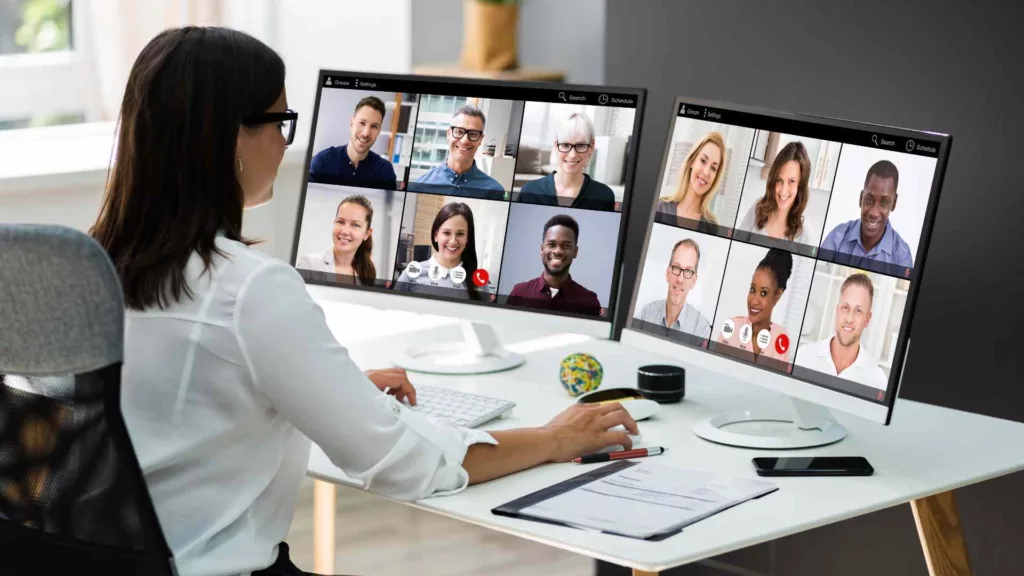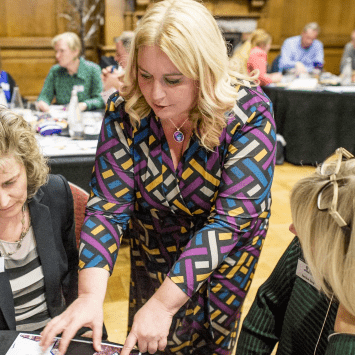Posted in Blog, Facilitation, Meetings, Virtual Facilitation by Jo North
How to Moderate a Meeting: Introduction
To moderate a meeting means to oversee and guide the discussion to ensure it remains focused, efficient, and inclusive. The moderator sets the agenda, enforces time limits, and facilitates dialogue among participants. The moderator’s role involves balancing speaking opportunities, managing disruptions, and steering the conversation toward productive outcomes. In essence, the moderator’s job is to ensure that the meeting achieves its goals while maintaining a respectful and engaging environment for all attendees.
Leading a meeting efficiently and effectively is an important skill. Whether you’re chairing a conference call, an online meeting, or a hybrid panel discussion, mastering the art of moderation can transform what could have been a chaotic gathering into a productive atmosphere.
My Experience as a Meeting Moderator
I have been a professional meeting moderator for over a decade, and have moderated meetings for literally thousands of people from places dotted all round the world. Clients often call on my meeting moderation skills, especially when they need to discuss difficult or challenging topics with diverse stakeholders.
This article outlines my essential strategies for effective meeting moderation, from setting ground rules to managing time and facilitating engagement.
Preparing Yourself
Mental Preparation
Cultivate the Right Mindset
Approach the meeting with positivity and openness. Expect that every participant brings value to the table. A constructive attitude helps manage discussions, even when they become challenging.
Visualize Success
Spend a few moments visualizing a successful meeting. Imagine engaging discussions, productive outcomes, and positive feedback.
Manage Anxiety
If nerves are an issue, practice deep breathing exercises. Recognizing that nervousness is normal can help reduce its impact, allowing you to focus on facilitating confidently and effectively.
Physical Preparation
Rest Well
Ensure you get a good night’s sleep before the meeting. Fatigue can affect concentration, decision-making, and energy levels, which are crucial for a moderator.
Dress Appropriately
Choose comfortable clothing that also reflects the meeting’s tone. Looking professional, even in a virtual environment, can influence how participants perceive and interact with you.
Set Up Your Space
Organize your physical or virtual workspace. Minimize distractions, check your internet connection, and ensure your audio and video equipment works well.
Getting Organized
Review the Agenda
Familiarize yourself with the meeting agenda thoroughly. Understanding each item’s purpose and expected outcome allows you to steer the conversation effectively.
Prepare Materials
Have all necessary documents, notes, and resources at hand. This could include the meeting agenda, participant list, and any background information relevant to the discussion topics.
Test Technology
For virtual meetings, test your software and hardware in advance. Know how to use features like screen sharing, mute/unmute participants, and manage breakout rooms if needed.
Plan for Contingencies
Have a backup plan for common issues, such as technological failures or unexpected absences. Knowing how to quickly pivot can keep the meeting on track despite obstacles.
Set Clear Objectives for Yourself
Identify what you aim to achieve as a moderator. Whether it’s ensuring every voice is heard or keeping the discussion within time limits, having clear goals helps maintain focus.

Preparing Your Meeting Participants
Here’s how to ensure participants are ready and equipped to contribute meaningfully.
Send Out Pre-Meeting Materials
Distribute the Agenda Early
Share a detailed agenda at least a few days in advance. This document should outline topics for discussion, objectives, and any relevant questions to consider.
Provide Background Information
If the meeting covers complex topics, include briefs or summaries that participants can review. This ensures everyone comes prepared with a basic understanding. You could also organize for key experts to give lightning talks at the beginning of your meeting.
Assign Pre-Meeting Tasks
For meetings that require input or presentations from certain attendees, communicate these expectations clearly, including any deadlines for submitting materials.
Communicate Expectations
Clarify Roles
If participants have specific roles during the meeting, such as presenter or note-taker, inform them ahead of time. This clarity helps individuals prepare accordingly.
Set Ground Rules
Outline expected behaviors and meeting etiquette. This might include guidelines on muting microphones when not speaking, turning on video, and how to signal a desire to contribute.
Offer Guidelines for Participation
Encourage Questions
Let participants know how and when they can ask questions, whether through a designated Q&A time, raising their hand, or using a chat feature in a virtual setting.
Promote Engagement
Explain the importance of active participation and how it contributes to the meeting’s success. Encourage attendees to come with ideas, questions, and feedback.
Provide Technical Instructions
Share Login Details
For virtual meetings, send out the link, meeting ID, and any necessary passwords well in advance. Include instructions for downloading software if needed.
Test Technology
Encourage participants to test their setup before the meeting. Provide a contact for technical support in case they encounter issues.
Offer a Point of Contact
Identify a Go-To Person
For any pre-meeting questions or concerns, designate a contact person. This could be an assistant, a co-moderator, or yourself.
Setting the Stage
Establish Clear Objectives
Before anything else, clarify the purpose of the meeting. A detailed agenda will help you to keep discussions on track.
Lay Down the Ground Rules
At the beginning of the session, introduce the ground rules. This could include guidelines on speaking time, handling background noise, and the use of cell phones. Clear rules prevent disruptions and ensure a smooth flow.
During the Meeting
Managing Time
As a good moderator, keeping an eye on the clock is your responsibility. Set time limits for agenda items and stick to them. This approach avoids the pitfall of certain topics consuming much time, leaving little for others.
Facilitating Discussion
Encourage participation by asking the right questions and inviting opinions from all group members. A productive moderated discussion ensures that no single person dominates, promoting a balanced exchange.
Create a dynamic environment by encouraging meeting participants to share new ideas. A good facilitator asks open-ended questions, prompting thoughtful responses. If you notice an awkward silence, use it as an opportunity to invite quieter members to contribute, ensuring equal opportunity for all.
When faced with negative feedback or disruptive behavior, respond in a polite yet firm way. Great moderators know how to turn potential conflicts into constructive discussions. A deep breath and a calm demeanor can help maintain a productive atmosphere.

Handling Technology
Make sure that you’re familiar with the Microsoft Teams, Zoom, Google Meet, Amazon Chime or other technology that you’re using. Use features such as the chat box for collecting questions in real time, keypad controls, waiting room and other features for managing large groups.
Observing Non-Verbal Cues
Even in an online environment, visual cues and body language play a crucial role. They can indicate when someone wishes to speak or is experiencing technical issues. Make sure that you pay attention to these non-verbal cues when you moderate a meeting.
Ending the Meeting
Wrapping Up
After the end of the meeting, reflect on what worked well and what could be better next time. Seeking feedback from board members, new researchers, and other attendees can provide valuable insights for improving your moderation skills. Remember, successful moderation is about learning and adapting.
Conclude with a summary of key points and action items. Set the agenda for the next meeting, ensuring a clear continuation of the discussion.
Post-Meeting Follow-Up
Update meeting notes and share them with participants. This helps keep everyone on the same page and reinforces the progress made.
Tips to Moderate a Meeting for the First Time
- Preparation is key: Conduct thorough research on the discussion topic. A prep call with panel members or key speakers can be a great way to start.
- Practice active listening: Show that you value participants’ input by responding to their ideas and integrating them into the discussion.
- Stay neutral: Maintain your role as a facilitator by not letting your own opinions overshadow the discussion.
- Manage disruptions politely: Address late arrivals or disruptive behavior in a polite but firm manner. A gentle reminder of the ground rules usually suffices.
Next Steps
It is not always easy to moderate a meeting successfully, but adopting these best practices will set you up for success. Remember, the role of the moderator is to guide the conversation in a way that achieves the meeting’s objectives while ensuring a fair and engaging experience for all participants. With practice and dedication, you’ll not only improve your skills as a moderator but also contribute significantly to the productivity and success of your meetings.
If you’d like any support or mentoring for developing your own skills and confidence to moderate a meeting, please do get in touch here to book your power hour with me. Or, if you’d like to explore booking my services to moderate a meeting on your behalf, please get in touch here for a no-obligation online chat. I look forward to hearing from you!


